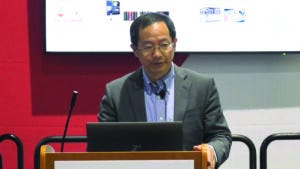- Sponsored Content
- Contract Services
How a Premier, Single-Source Platform Accelerates Biologic Drug Discovery and InnovationHow a Premier, Single-Source Platform Accelerates Biologic Drug Discovery and Innovation
August 24, 2022
Sponsored by WuXi Biologics
 Jijie Gu, chief scientific officer, WuXi Biologics.
Jijie Gu, chief scientific officer, WuXi Biologics.
WuXi Biologics has established itself as a contract research, development, and manufacturing organization (CRDMO) with comprehensive capabilities for multiple biopharmaceutical modalities. Gu presented on advances that his company has made in contract research for drug discovery. WuXi Biologics provides services for target evaluation, antibody generation, lead identification and optimization (LI and LO), developability study, and regulatory submission.
The company leverages multiple platforms to accelerate LI, including an improved murine hybridoma technology with optimized immunization protocols. Through a partnership with Ligand Pharmaceuticals, WuXi Biologics can apply OmniAb technology (including the OmniRat, OmniMouse, and OmniFlic platforms) for animal-based discovery of fully human IgGs.Customers can use naive or synthetic phage-display libraries. Gu’s company also performs nanobody discovery based on naive and synthetic camelid antibody libraries.
Computer-assisted and artificial-intelligence–assisted drug discovery (CADD and AIDD) methods quickly are becoming valuable tools for LI, Gu explained. WuXi Biologics has applied AIDD to identify novel binders and is developing algorithms for de novo antibody discovery. Gu also highlighted the promise of single B-cell cloning technologies such as the Berkeley Lights Beacon system. Such instruments rapidly isolate and screen B cells derived from humans or humanized animal subjects. Lead candidates are identified, sequenced, and studied for developability. WuXi Biologics already has used rodent models and applied antirodent antibodies for B-cell enrichment. The company is developing capabilities for other species. Berkeley Lights technology has helped WuXi Biologics customers to establish preclinical candidates (PCCs) in less than six months.
Turning to LO, Gu noted that WuXi Biologics performs in silico structure-based humanization of rodent and alpaca antibodies. Design, production, and testing can be completed in about four weeks, and resulting antibodies show little immunogenicity risk. Lead candidates undergo both structure- and library-based affinity maturation. WuXi Biologics has enhanced its technologies for phage and yeast display and for Fc engineering. AIDD also is helping the company to engineer antibodies with minimal liabilities for posttranslational modifications and to perform conditional biologics assessment.
In silico tools are proving to be equally valuable for developability study. Gu emphasized that homogeneity, stability, solubility, and specificity must be evaluated early in drug discovery so that chemistry, manufacturing, and controls (CMC)-stage development can focus on tailoring host cell lines and expressed proteins to drug substance and product manufacturing. Computational capabilities also can help with prediction and reduction of immunogenicity risks.
Gu asserted that multispecifics are poised to become the future of protein-based therapeutics — although impediments remain. Bispecific antibodies (bsAbs) generally take a long time to develop and often exhibit stability, solubility, and immunogenicity problems. Thus, WuXi Biologics has established several platforms for such modalities, including the popular WuXiBody bsAb format, which provides for flexibility in binding sites and has a half-life like that of an IgG. The platform exhibits high stability and solubility, minimizing developability liabilities. Compared with other bispecifics, WuXiBody bsAbs can be expressed at high titers and recovered easily during downstream processing. Gu also called attention to his company’s SDArBody format, which leverages nanobodies to develop multispecific/functional proteins, and a platform for bsAb T-cell engagers based on a cross-reactive anti-CD3 antibody derived from cynomolgus monkeys.
Because antibody–drug conjugates (ADCs) also raise substantial development difficulties, WuXi Biologics has established integrated services for ADC discovery. The WuXi XDC business unit provides users with access to a comprehensive library of linkers and payloads as well as custom solutions for payload/linker synthesis. The team also performs bioconjugation, leveraging its WuXiDAR4 platform to improve ADC homogeneity. Gu added that ADC development often requires work with multiple suppliers and service providers. The WuXi XDC team brings all activities from discovery through PCC development into the same location.
Leveraging those platforms and strong regional and global networks, WuXi Biologics intends to facilitate drug discovery for multiple modalities. The goal, Gu said, is to help developers transition easily into CMC-stage activities and beyond.
Fill out the form below to view the full BPI Theater presentation.
You May Also Like





